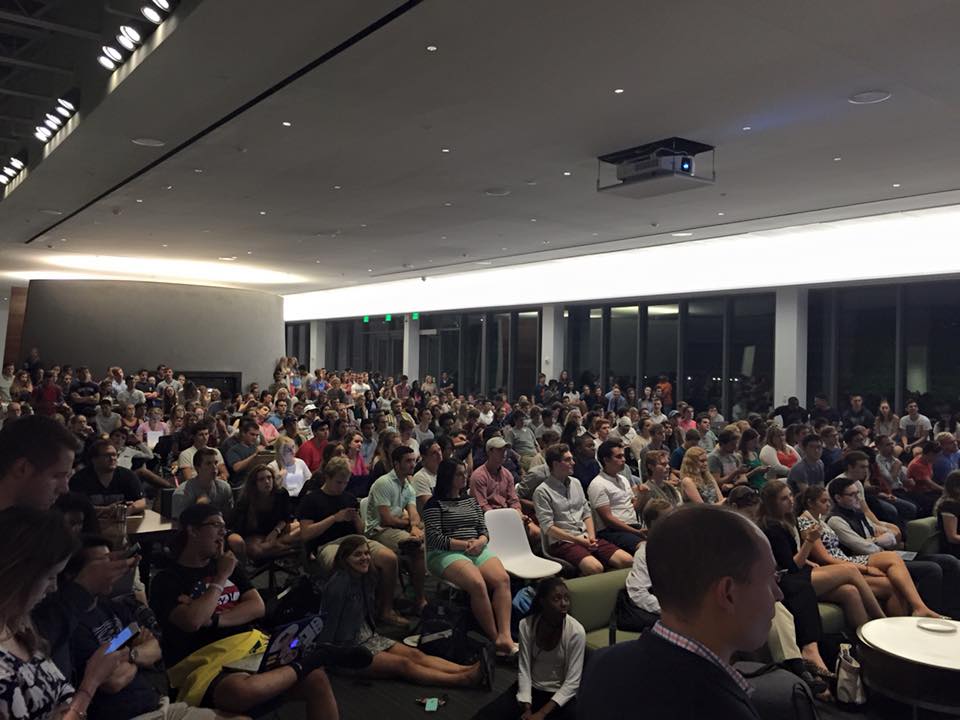As the 2016 election cycle intensifies, Georgetown students have begun to organize themselves into various campaign groups supporting the presidential candidate of their choice.
Current groups supporting Democratic candidates include Hoyas for Hillary and Georgetown for Bernie 2016, while Students for Rubio and Students for Paul represent two of the Republican candidates. The presence of the groups on campus is new and the groups are still in the process of building their teams and organizing their efforts.
Hoyas for Hillary, for example, launched this semester at Georgetown and is one of several campus groups that is officially affiliated with Ms. Clinton’s campaign. The group, formed by Amanda Shepherd (SFS ’18) following her summer internship at the campaign headquarters in New York, aims to support Clinton’s campaign through efforts both on and off campus.
“I see the role of the Hillary group on campus as part of the larger grassroots initiative the campaign is undertaking,” Shepherd said. “We are going to be doing events on campus like educational events about her positions and why as college students we believe that she is good for us, and also going out to the D.C. community and helping with the larger grassroots initiative of building the database and getting people in the area excited about Hillary as well.”
Georgetown for Bernie 2016 launched informally this summer by Tiffany Lachhonna (COL ‘15) as a Facebook group expressing support for Bernie Sanders’s candidacy. The Facebook page developed into a more cohesive group of roughly 60 to 140 Georgetown undergraduates now led by Erin Leonard (SFS ‘16), Irene Koo (COL ‘16), and Caleb Weaver (SFS ‘16). The group seeks to promote Sanders by providing information about the candidate, registering students to vote, and participating in an upcoming photo campaign and march in Washington, D.C. It also held a fundraising party to support Sanders and boost excitement on campus.
Additionally, the group is planning to work in conjunction with other existing political organizations. It receives information and tasks from National College Students for Bernie, which recently requested college groups to spread awareness for Sanders through phone banking. The Georgetown group also has tentative plans to cosponsor events with Hoyas for Hillary, College Democrats, and Georgetown Law Students for Bernie.
While Georgetown is already known for its political tendencies, these new groups give students the opportunity to support their preferred candidates in a venue separate from existing political organizations on campus – Georgetown University College Republicans and GU College Democrats – since those groups are restricted from taking part in explicit campaign activity.
Amber Athey (COL ’16), Chair of the College Republicans, said, “College Republicans is not allowed to do any campaigning as a student organization. It’s the same with [College Democrats], as a nonprofit we’re not allowed to campaign.”
Still, evident overlap lawfully exists between the campaign groups and the political organizations. Many of the members of the former also belong to one of the latter, and both the College Democrats and College Republicans anticipate co-sponsoring non-campaign events with the candidate groups, such as roundtable discussions or straw polling.
Matthew Gregory (SFS ‘17), President of College Democrats, wrote in an email to the Voice, “Much of our membership overlaps with either the pro-Hillary or pro-Bernie crowds, and we look forward to these individuals sharing their perspectives on 2016 with the general body when attending GUCD meetings and events this semester.”
Georgetown’s Office of Federal Relations sent an email to students on Sept. 11 reminding them to be mindful of rules regulating campaign activity at Georgetown. While political activity is welcome, as a tax-exempt organization, the university cannot allow its resources to support partisan campaign efforts, according to Scott Fleming, Associate Vice President for Federal Relations.
“That goes broadly, everything from Xerox machines, to using a room for a partisan political gathering, to using university email for that purpose,” said Fleming.
Representatives from Georgetown for Bernie 2016 said they spoke with Scott Fleming to understand the campaign rules and noted that they use only student-provided funds and their off-campus housing as a resource. While the group acknowledged their kickoff party occurred in Village B, going forward they intend on only hosting meetings and events on off-campus locations, according to Leonard.
“Apart from our group being called Georgetown for Bernie, we’re very careful about making sure it’s student driven and that we’re not pretending to represent the university,” said student leader Irene Koo.
Fleming also noted that it is important for the university to remain politically balanced in its events. For example, the university has worked in the past with College Democrats and College Republicans to host surrogate debates, where each presidential campaign designates a surrogate to debate issues. In discussing the need for balance in these debates and other occasions when political speakers are brought to campus, Fleming said, “If we invite a candidate to campus, then it is incumbent upon us to invite everybody who is running against that candidate.”
Though only college students, representatives from both parties anticipate the student groups leaving an impact on the election.
“Social media is a big factor, especially for Republicans, we’ve struggled with social media in the past. I think having student groups who can set up Twitter and Instagram accounts for these candidates gives them more leverage with youth voters,” Athey said.
“Many students are passionate in their belief that one candidate should be the next President of the United States, and campaign organizations allow such students to advocate on behalf of their electoral preferences in a direct and tangible manner,” Gregory wrote in an email to the Voice.






